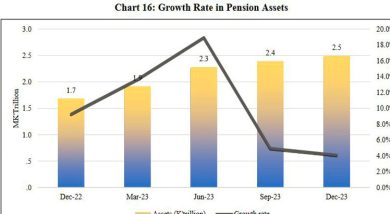Malawi domestic borrowing appetite dwindles
 Malawi Government’s ease on local borrowing through its fiscal anchor of no net domestic financing has reduced the allure of the money market, with last week’s treasury bills (T-bills) rejection rate peaking at a high of 71 percent.
Malawi Government’s ease on local borrowing through its fiscal anchor of no net domestic financing has reduced the allure of the money market, with last week’s treasury bills (T-bills) rejection rate peaking at a high of 71 percent.
At the same time, the T-bills rates have considerably dropped over the past few months to an average of 22 percent from a high of 35 percent in July this year, when government’s fiscal stance kicked in.
The rise in money market rates over the past months compelled commercial banks to put their base lending rates at above 40 percent even when the Reserve Bank of Malawi (RBM) has, since December 2012, maintained the bank rate—the rate at which commercial banks borrow from the central bank as a lender of last resort—at 25 percent.
But since the T-bills rates started easing coupled with the drop in inflation, currently at 25.7 percent as of July 2013, according to the National Statistical Office (NSO), commercial banks have also responded by reducing their lending rates to about 38 percent.
Malawi Finance Minister Ken Lipenga, in the 2013/14 National Budget statement, noted that the current fiscal stance is aimed at reducing the domestic debt stock, which closed the last fiscal year at K170.6 billion (about $426m), to allow the private sector space to borrow at ‘reasonable’ rates for productive investment.
In the budget, it was indicated that in the current financial year, K7.2 billion (about $18m) or 0.5 percent of gross domestic product (GDP), will be used to repay domestic debt, effectively reducing the domestic debt stock to K163.4 billion (about $408m) at the close of 2013/14 financial year, in line with the fiscal anchor.
Analysts complained that monetary and fiscal policies were moving in opposite directions, thwarting the resolve of monetary authorities to reduce inflation and stabilise exchange rate.
“You will agree with me that in the past, programme targets were missed primarily on account of loose fiscal stance. In order to sustain and build on the gains achieved so far, the fiscal policy will have to remain very tight in the coming year,” Lipenga assured in the budget.
Last week’s T-bills auction results showed that authorities are sticking to their fiscal stance, according to Nico Asset Managers weekly financial markets update, when they raised the announced K6 billion.
But total applications from market was at K21 billion, putting the rejection rate at a high of 71 percent.
The T-bills results show that 73 percent of the allotments were on the 364 days tenor while 15 percent and seven percent were allotted to the 182 days and 91 days tenors respectively.
Effectively, the rates on all tenors have dropped during the week.
University of Malawi’s Chancellor College economics professor Ben Kaluwa said the high rejection rate coupled with the decrease in T-bills rates shows that government’s appetite for domestic borrowing is fast reducing.
The International Monetary Fund (IMF) Mission, at the conclusion of the ongoing Extended Credit Facility (ECF) third review in June highlighted the need for fiscal discipline by spending within available resources.





